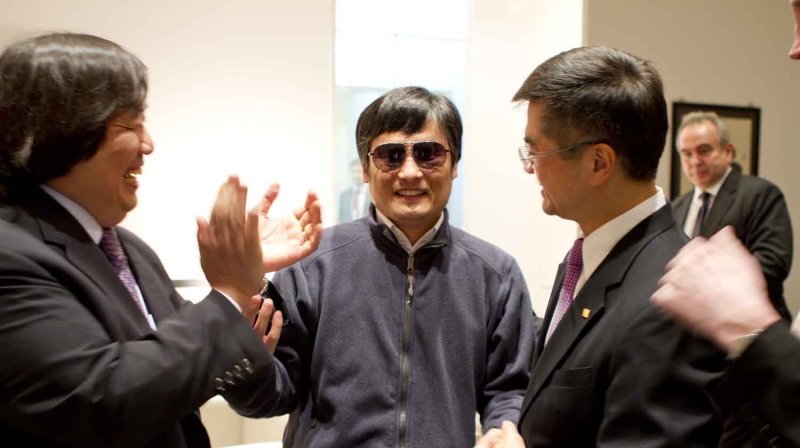1 of 15 | In this photo released by the U.S. embassy Beijing Press Office, blind Chinese dissident Chen Chuangcheng (C) shakes hands with U.S. Ambassador to China Gary Locke (R) along with other embassy officials in Beijing on May 2, 2012. Chen left the U.S. Embassy and is now under Chinese control in a Beijing hospital, but is now apparently asking for asylum in the United States. UPI |
License Photo
BEIJING, May 3 (UPI) -- The Chinese activist who left the U.S. Embassy in Beijing after fleeing house arrest says he now wants to leave China.
U.S. Embassy officials said they spoke Thursday with Chen Guangcheng, who was undergoing tests in a Beijing hospital, and are aware he has changed his mind about staying in China as a freedom fighter.
"It's apparent that he's had some change of heart," U.S. Ambassador to China Gary Locke told ABC News. "We've got to deal with that, and so we want to sit down with him and his family together, his wife together. Let's find out exactly what they're thinking and let's explore the options."
Chen said earlier he wants U.S. officials to help get him and his family to America.
"I want them to protect human rights through concrete actions," Chen told CNN Thursday from his hospital room. "We are in danger. If you can talk to [Secretary of State Hillary Clinton], I hope she can help my whole family leave China."
Chen's comments left U.S. officials defending the deal concerning Chen's future that was brokered with Chinese authorities, as human rights organizations questioned whether China would keep its side of the bargain.
Clinton is in China with U.S. Treasury Secretary Timothy Geithner for high-level discussion on several issues.
U.S. officials in Beijing Thursday emphasized Chen's decision to leave the U.S. Embassy Wednesday was his alone. He left the diplomatic compound to go to the hospital for medical treatment and meet his family.
"I can tell you unequivocally that he was never pressured to leave," Locke told reporters. "He was excited and eager about leaving."
Chen, who is blind, earlier said he wanted to remain in China.
The 40-year-old self-taught lawyer escaped house arrest last month from a village in Shandong province and fled to Beijing, where he took refuge in the embassy for six days before going to the hospital.
When Chen left the embassy, U.S. officials said the Chinese government committed to relocate him to a "safe environment" after Chen and his family said they were subjected to harsh treatment by local authorities. U.S. officials said China also agreed to investigate the allegations of mistreatment and said Chen won't face further legal issues.
In a statement Wednesday, Clinton said, "The United States government and the American people are committed to remaining engaged with Mr. Chen and his family in the days, weeks and years ahead."
Human rights groups, however, expressed doubt about whether China would keep its side of the agreement.
"There are serious concerns over whether the Chinese government will honor commitments it made to the U.S. government to not persecute Chen and his family members," Human Rights Watch's China director, Sophie Richardson, said in a statement.
Chinese officials did not comment directly on deal, instead criticizing what they said was "interference" by the United States in China's internal affairs, CNN said.
Senior officials from both countries met Thursday in Beijing for scheduled talks about strategic and economic issues.
During a speech at the meeting, Clinton discussed human rights but did not mention Chen, CNN said.
"As part of our dialogue, the United States raises the importance of human rights and fundamental freedoms because we believe that all governments do have to answer to citizens' aspirations for dignity and the rule of law and that no nation can or should deny those rights," she said.
Chinese President Hu Jintao said the two countries "should approach our differences in a correct way, and respect and accommodate each other's interests and concerns."















